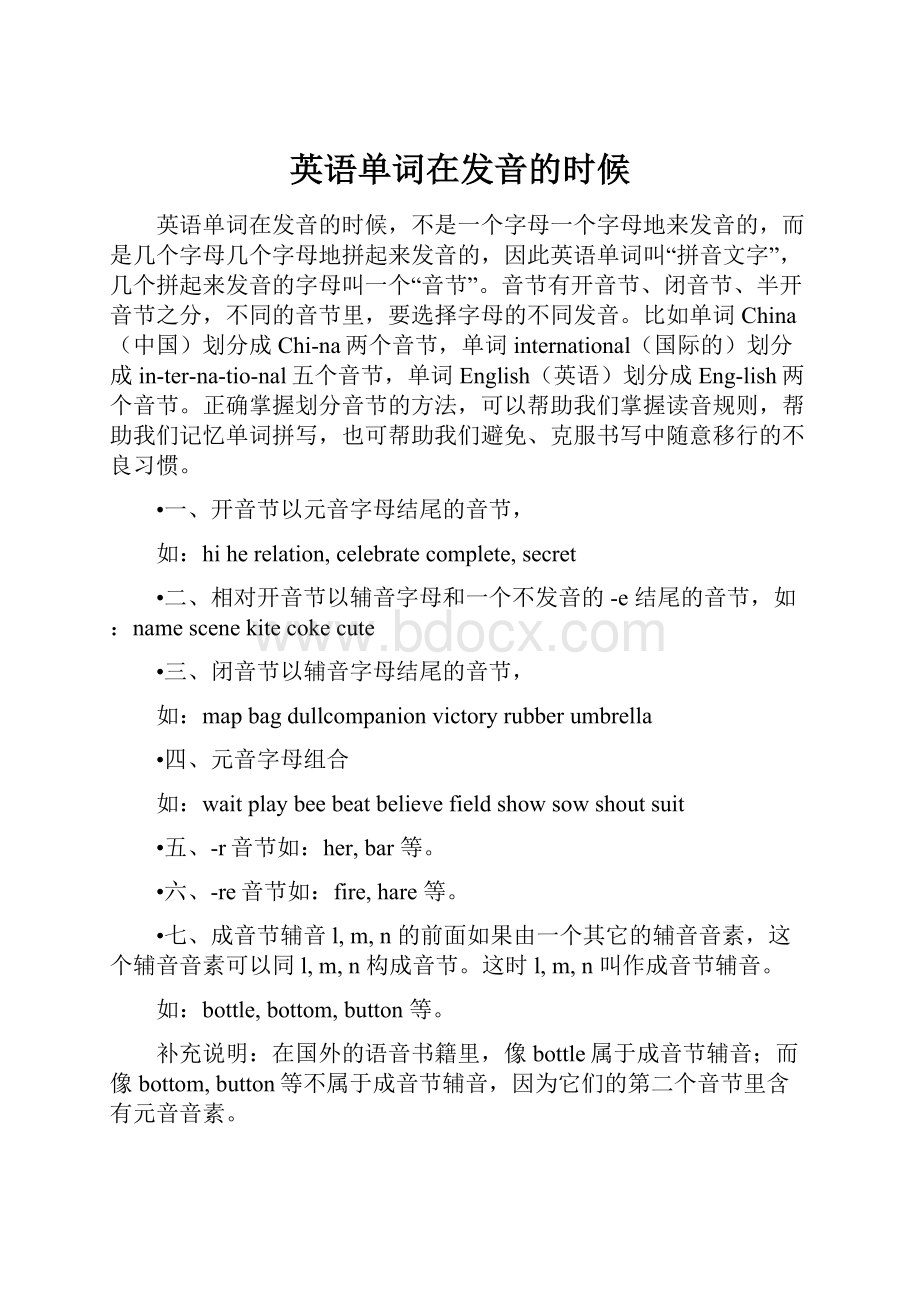英语单词在发音的时候.docx
《英语单词在发音的时候.docx》由会员分享,可在线阅读,更多相关《英语单词在发音的时候.docx(27页珍藏版)》请在冰豆网上搜索。

英语单词在发音的时候
英语单词在发音的时候,不是一个字母一个字母地来发音的,而是几个字母几个字母地拼起来发音的,因此英语单词叫“拼音文字”,几个拼起来发音的字母叫一个“音节”。
音节有开音节、闭音节、半开音节之分,不同的音节里,要选择字母的不同发音。
比如单词China(中国)划分成Chi-na两个音节,单词international(国际的)划分成in-ter-na-tio-nal五个音节,单词English(英语)划分成Eng-lish两个音节。
正确掌握划分音节的方法,可以帮助我们掌握读音规则,帮助我们记忆单词拼写,也可帮助我们避免、克服书写中随意移行的不良习惯。
•一、开音节以元音字母结尾的音节,
如:
hiherelation,celebratecomplete,secret
•二、相对开音节以辅音字母和一个不发音的-e结尾的音节,如:
namescenekitecokecute
•三、闭音节以辅音字母结尾的音节,
如:
mapbagdullcompanionvictoryrubberumbrella
•四、元音字母组合
如:
waitplaybeebeatbelievefieldshowsowshoutsuit
•五、-r音节如:
her,bar等。
•六、-re音节如:
fire,hare等。
•七、成音节辅音l,m,n的前面如果由一个其它的辅音音素,这个辅音音素可以同l,m,n构成音节。
这时l,m,n叫作成音节辅音。
如:
bottle,bottom,button等。
补充说明:
在国外的语音书籍里,像bottle属于成音节辅音;而像bottom,button等不属于成音节辅音,因为它们的第二个音节里含有元音音素。
•1.开音节:
a)辅音+元音+辅音+e:
name,bike,home,due,plane,shine
b)辅音+元音:
he,go,hi,do,be,tree,three,hello
•2.闭音节:
a)辅音+元音+辅音:
bad,bed,sit,hot,cup,let,mad,map
b)元音+辅音:
it,is,of,in,on,up,out,ant
•3.重读音节:
单词中发音特别响亮的音节。
.一个音节至少有一个元音字母。
即a,e,i,o,或u,有时也可以是y。
例如:
re/fuse,un/com/for/ta/ble,jum/ping,a/void/ed,gar/lic,for/ty
2.当两个元音字母中间只有一个辅音字母时(辅音字母r除外),而且左边的元音又是按重读开音节规则发音,这个辅音字母通常划入右边的音节。
例如:
stu/dent,o/pen,pa/per,va/cant,pi/lot
3.两个元音之间只有一个辅音字母或辅音字母组合,左边的元音按重读闭音节规则发音,那么,这个辅音字母或辅音字母组合通常划入左边的音节。
例如:
moth/er,slith/er
8.辅音字母组合构成发音的辅音连缀,划分音节时,也不能将其分开。
例如:
de/sroy,ex/pli/cit,pre/scribe,in/struc/tion
9.如果一个单词是以字母-le结尾,并且辅音-le前面还有一个辅音字母,那么这个辅音字母通常划分在右边这个音节里。
因为发音时,这是一个成音节。
例如:
ta/ble,un/cle,mar/ble,peo/ple,hur/dle,sta/ble
但是,以-ckle结尾的单词例外。
因为辅音字母-c不发音,所以辅音字母-ck划分在左边的音节里。
例如:
pick/le,buck/le,sick/le
10.加前缀时,前缀单独划为一个或一个以上的音节。
例如:
dis/like,be/head,in/ac/tive,im/pos/si/ble,sem/i/cir/cle,su/per/man,o/ver/sleep,an/ti/air/craft
11.加后缀时,后缀不影响其他音节的划分。
例如:
paint/er,pass/a/ble,dif/fer/ent,fall/ing,friend/ship,seek/ers多数后缀如-ing,-ed,-ment,-ty,单独划分音节。
12.如果后缀-ed加在以-t或-d结尾的单词后面,发/-id/,构成一个音节,拼写时可单独划分为一个音节;反之,其他情况下不算一个独立的音节。
例如:
pre/dict/ed,test/ed,lift/ed,fin/ished,fol/lowed,un/fogged
a
•在开音节中[ei]nameplaneJanebabycake
•在闭音节中[æ]bagdadhatmapblackback
e
•在开音节中[i:
]hethesemeChinese
•在闭音节中[e]bedletpendeskyesegg
i
•在开音节中[ai]bikeflydrivetimenicekite
•在闭音节中[i]fishbigdrinksitmilkswim
o
•在开音节中[ou]thoseclosegohoehomeno
•在闭音节中[ɒ]clocknotboxshopsock
u
•在开音节中[ju:
]studentexcusedutyTuesday
•在闭音节中[Λ]buscupjumpmuchlunch
•pen钢笔
•pencil铅笔
•pencil-case文具盒
•book书
•bag包
•ruler尺子
•eraser橡皮擦
•crayon蜡笔
•sharpener卷笔刀
•newspaper报纸
•dictionary字典
•notebook笔记本
•comicbook漫画书
•story-book故事书
•schoolbag书包
•peach桃子
•pear梨子
•orange橘子
•watermelon西瓜
•apple苹果
•banana香蕉
•grape葡萄
•strawberry草莓
•lemon 柠檬
•mango芒果
•pineapple菠萝
•cake蛋糕
•bread面包
•hotdog火腿、热狗
•hamburger汉堡
•chicken鸡肉
•Frenchfries炸薯条
•coke可乐
•juice果汁
•water水
•tea茶
•coffee咖啡
•chocolate巧克力
•fish鱼
•noodles面条
•beef牛肉
•meat肉
•soup汤
•rice米饭
•milk牛奶
•egg鸡蛋
•tomato西红柿
•potato土豆
•January(Jan.)一月
•February(Feb.) 二月
•March(Mar.) 三月
•April(Apr.) 四月
•May 五月
•June(Jun.)六月
•July (Jul.)七月
•August(Aug.)八月
•September(Sept.)九月
•October(Oct.)十月
•November(Nov.) 十一月
•December(Dec.)十二月
•Sunday(Sun.)
•Monday(Mon.)
•Tuesday(Tue.)
•Wednesday(Wed.)
•Thursday(Thur.)
•Friday(Fri.)
•Saturday(Sat.)
•spring
•summer
•fall(autumn)
•winter
•早晨morning
•下午afternoon
•晚上evening
•夜里night
•bus
•bike
•taxi
•jeep
•car
•plane
•ship
•subway
•foot
•train
•boat
•motorcycle
•boy
•girl
•friend
•parents
•father
•mother
•uncle
•aunt
•sister
•brother
•mom
•dad
•grandpa/grandfather
•grandma/grandmother
•cousin
•son
•daughter
•baby
•kid
•Mr
•Miss
•lady
•snowman
•cat
•dog
•monkey
•panda
•rabbit
•duck
•pig
•mouse
•elephant
•bird
•bear
•snake
•zebra
•斑马
•giraffe
•长颈鹿
•deer
•鹿
•kangaroo
•袋鼠
•horse
•马
•sheep
•绵羊
•fish
•鱼
•cow
•奶牛
•ox
•公牛
•cock
•公鸡
•hen
•母鸡
•tiger
•老虎
•lion
•狮子
•butterfly
•蝴蝶
•goose
•鹅
•fox
•狐狸
•turkey
•火鸡
•ant
•蚂蚁
•shark
•鲨鱼
•dragon
•龙
•driver
•doctor
•farmer
•nurse
•teacher
•student
•worker
•writer
•singer
•policeman
•salesperson
•waiter
•firefighter
•司机
•医生
•农民
•护士
•教师
•学生
•工人
•作家
•歌唱家
•警察
•售货员
•服务员
•消防员
•yellow
•黄色
•red
•红色
•green
•绿色
•blue
•蓝色
•purple
•紫色
•white
•白色
•black
•黑色
•orange
•橙色
•pink
•粉红色
•brown
•褐色
•grey
•灰色
•Chinese
•math
•English
•P.E.
•sports
•music
•art
•science
•computer
•painting
•moralEducation
•SocialStudies
•语文
•数学
•英语
•体育
•体育运动
•音乐
•美术
•科学
•电脑
•绘画
•思想品德课
•社会课
•篮球basketball
•足球football/soccer
•排球volleyball
•网球tennis
•早餐breakfast
•午餐lunch
•晚餐supper
•正餐dinner
•sweater
•jeans
•pants
•Trousers
•socks
•shorts
•pants
•gloves
•jacket
•shirt
•skirt
•dress
•T-shirt
•coat
• raincoat
•hat
•cap
•毛衣
•牛仔裤
•长裤
•裤子
•袜子
•短裤
•裤子
•手套
•夹克衫
•衬衣
•短裙
•连衣裙
• 体恤衫
• 大衣
•雨衣
•帽子 (周围有帽沿的)
•便帽(前边有帽沿的)
•hot
•cold
•warm
•cool
•rainy
•windy
•cloudy
•snowy
•sunny
•weatherreport
•nice
•热的
•冷的
•温暖的
•凉爽的
•多雨的
•多风的
•多云的
•多雪的
•晴朗的
•天气预报
•好的,漂亮的
•big(大的)-----small(小的)bad(坏的)-----good(好的)
•black(黑的)-----white(白的)cold(冷的)-----hot(热的)
•cool(凉爽的)-----warm(温暖的)come(来)-----go(去)
•cry(哭)-----laugh(笑)dirty(脏的)-----clean(干净的)
•day(白天)-----night(夜晚)early(早的)-----late(迟的)
•fast(快的)-----slow(慢的)left(左)-----right(右)
•glad(高兴的)---sad(悲伤的)in(里面)-----out(外面)
•new(新的)-----old(旧的)stand(站)-----sit(坐)
•like(喜欢)-----hate(厌恶)open(开)-----close(关)
•short(矮的)-----tall(高的)short(短的)-----long(长的)
•thick(厚的)-----thin(薄的)thin(瘦的)-----fat(肥的)
•up(向上)------down(向下)wrong(错的)-----right(对的)
•weak(弱的)-----strong(强壮的)young(年轻的)-----old(年老的
•what
•when
•why
•where
•which
•whichone
•who
•whose
•how
•howmany\howmuch
•howold
•whattime
•whatday
•whatcolor
•什么
•什么时候
•为什么
•哪里
•哪一个
•哪一个
•谁
•谁的
•怎么样
•多少
•几岁
•什么时间
•星期几
•什么颜色
•1.一般情况下,直接加-s,如:
book-books,bag-bags,cat-cats,bed-beds
•2.以s.x.sh.ch结尾,加-es,如:
bus-buses,box-boxes,brush-brushes,watch-watches
•3.以“辅音字母+y”结尾,变y为i,再加-es,如:
family-families,strawberry-strawberries
•4.以“f或fe”结尾,变f或fe为v,再加-es,如:
knife-knives
•5.不规则名词复数:
man-men,woman-women,policeman-policemen,policewoman-policewomen,mouse-mice,child-children,foot-feet,.tooth-teeth,fish-fish,people-people,Chinese-Chinese,Japanese-Japanese
•注意:
名词分可数与不可数名词。
可数名词改复数时,要分清有规则的还是没有规则的。
不可数名词没有复数形式。
•写出下列各词的复数
•I_________him_________
•this___________her______
•watch_______child_______
•photo________diary______
•day________foot________
•book_______dress________
•tooth_______sheep______
•box_______strawberry____
•thief_______yo-yo______
•peach______sandwich______
•man______woman_______
•paper_______ juice___________
•water________milk________
•rice__________tea__________
•用适当的be动词填空。
•1.I_____astudent.2.You ____ a doctor.
•3.____she from Jinan?
4._____you American(美国人)?
•5.He _____ in Class 4, Grade 1.6.It_____ a car.
•7.They ____ cars.8.____ your mother in China?
•9._____your friends in New York?
10.What ____her name?
•11.These _____ buses.12.Those _____oranges.
•13.Where _____ her mother?
14.How old _____your teacher?
•15.What class _____ you in?
16.We_____friends.
•17.He_____agoodboy.18.She______ismysister.
•19.They_____playingfootball.20.You______myfriend.
•1.It’sapen.(改为复数句)____________________________________________
•2.Thisisamap.(改为复数句)__________________________________________
•3.That’sanapple.(改为复数句)________________________________________
•4.She’sfromEngland.(改为复数句)____________________________________
•5.Isthisabus?
(改为复数句)__________________________________________
•6.What’sthat?
(改为复数句)__________________________________________
•7.Arethoseoranges?
(改为单数句)_____________________________________
•8.Theyareeggs.(改为单数句)_________________________________________
•9.TheseareEnglishbooks.(改为单数句)________________________________
•否定句主要是在肯定句的基础上加上了否定词“not”。
有动词be的句子则“not”加在be后面,可缩写成“isn’t,aren’t”,但amnot一般都分开写。
没有动词be的句子则要先在主要动词的前面加上一个助动词(do,does),然后在它后面加上“not”,你也可以把它们缩写在一起如“don’t,doesn’t)。
这三个助动词要根据人称和时态来选择,其中“does”只用于一般现在时主语是第三人称单数的情况。
•注意:
句子中如果有some的话,在否定句中要改成any。
•把下列句子变成否定句:
•1.Iamlisteningtomusic._______________________________________
•2.Mikeisastudent._______________________________________
•3.Sarahcancleantheclassroom.________________________________________
•4.Theyareinthezoo.________________________________________
•5.Therearesomeflowersinthevase.________________________________________
•6.Thisismysister._________________________________________
•7.Wearesweepingthefloor.__________________________________________
•8.Weneedsomemasks._________________________________
•9.Theylikemakingthepuppet._________________________________
•10.SuHaiandSuYangliveinanewhouse._________________________________________________
•1.有be动词/情态动词:
be动词/情态动词提到句首,其余照抄,(some改成any,my改成your)句末用问号。
•2.无be动词/情态动词,在句首加Do/Does/Did,其余照抄,(some改成any,my改成your)句末用问号。
•3.加Does、did的句子注意,句子动词要变成原形。
•例如:
•陈述句:
Theyareinthepark.→Hecanplaytheguitar..
•一般疑问句:
Aretheyinthepark?
→Canheplaytheguitar?
•陈述句:
Iliketheducks.→Helikesthedogs.
•一般疑问句:
Doyouliketheducks?
→Doeshelikethedogs?
•把下列句子变成一般疑问句
•1.Iamlisteningtomusic._______________________________________
•2.Mikeisastudent.___